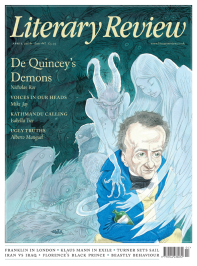Robert Irwin
Eastern Promises
This Orient Isle: Elizabethan England and the Islamic World
By Jerry Brotton
Allen Lane 358pp £20
Politics, commerce and drama mingle in this account of England’s relations with the Muslim world in the 16th century. Queen Elizabeth and her counsellors were chiefly concerned to find allies who might join England in its struggle against Catholic Spain, ruled by the Habsburgs. At first the Ottoman Turkish sultans, the Moroccan Sa‘did sharifs and the Safavid shahs of Persia were disinclined to take England seriously as a military power. Although the English victory over the Spanish Armada in 1588 changed perceptions, the political quest for a military alliance against the Habsburgs never came to much. But diplomatic and military démarches ran in tandem with commercial negotiations and in Jerry Brotton’s This Orient Isle it is commerce that receives the most attention. The Muscovy Company (chartered in 1555), the Turkey Company (1581), the East India Company (1600) and others sought to export English broadcloth, tin, lead and firearms to the Islamic lands in exchange for silks and other textiles, as well as spices. Critics of trade with the infidel (and there were many) dismissed the imports from the Orient as mere fripperies and questioned the morality of selling weapons to Muslims. International commerce in the 16th century was a hazardous business. The daring and conscientious men who combined trade with diplomacy, such as William Harborne in Istanbul, Edmund Hogan in Morocco and Anthony Jenkinson, who led trade missions through Muscovite territory to Persia, emerge as heroes in Brotton’s carefully researched narrative.
But the world of international commerce and diplomacy had its dodgy side as well and some merchants doubled as buccaneers. There were also chancers, charlatans, remittance men and renegades. The Sherley brothers command the most attention. In large part, this was because of their enormous talent for publicising themselves, though

Sign Up to our newsletter
Receive free articles, highlights from the archive, news, details of prizes, and much more.@Lit_Review
Follow Literary Review on Twitter
Twitter Feed
Margaret Atwood has become a cultural weathervane, blamed for predicting dystopia and celebrated for resisting it. Yet her ‘memoir of sorts’ reveals a more complicated, playful figure.
@sophieolive introduces us to a young Peggy.
Sophie Oliver - Ms Fixit’s Characteristics
Sophie Oliver: Ms Fixit’s Characteristics - Book of Lives: A Memoir of Sorts by Margaret Atwood
literaryreview.co.uk
For a writer so ubiquitous, George Orwell remains curiously elusive. His voice is lost, his image scarce; all that survives is the prose, and the interpretations built upon it.
@Dorianlynskey wonders what is to be done.
Dorian Lynskey - Doublethink & Doubt
Dorian Lynskey: Doublethink & Doubt - Orwell: 2+2=5 by Raoul Peck (dir); George Orwell: Life and Legacy by Robert Colls
literaryreview.co.uk
The court of Henry VIII is easy to envision thanks to Hans Holbein the Younger’s portraits: the bearded king, Anne of Cleves in red and gold, Thomas Cromwell demure in black.
Peter Marshall paints a picture of the artist himself.
Peter Marshall - Varnish & Virtue
Peter Marshall: Varnish & Virtue - Holbein: Renaissance Master by Elizabeth Goldring
literaryreview.co.uk